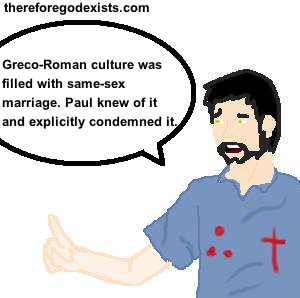 During an era of what one preacher called a sexual revolution, many Christians find themselves knuckling under and surrendering to the pressure and accusation of mainstream society. Homosexual Christians are flamboyantly displaying their sexual preferences for all to see, not necessarily saying that the Bible is wrong, but saying that the Bible is silent on the issue of same-sex marriage. Some of us have heard of Matthew Vine’s best seller, God And The Gay Christian, in which he argued just that. So then, what does the Bible say about same-sex marriage?
During an era of what one preacher called a sexual revolution, many Christians find themselves knuckling under and surrendering to the pressure and accusation of mainstream society. Homosexual Christians are flamboyantly displaying their sexual preferences for all to see, not necessarily saying that the Bible is wrong, but saying that the Bible is silent on the issue of same-sex marriage. Some of us have heard of Matthew Vine’s best seller, God And The Gay Christian, in which he argued just that. So then, what does the Bible say about same-sex marriage?
Let me begin by telling you what the Bible does not say. While it can be a very heavy topic and emotionally loaded, it does not say that parents ought to tell their children that they are a disgrace and disconnect them from the family. If we treated all non-believers as such, there would be nobody left to teach the gospel to and the Great Commission would be totally undermined. The Bible tells us of church discipline that within the congregation, if there is unrepentant sin, then we need to respond to it (Matthew 18:15-19). If it is outside of the congregation, then if we were to disassociate with all of the immoral people of the world, we would have to leave the world (First Corinthians 5:10). I think it might be rightly charged against Christians that they have severely mishandled the issue of homosexuality, and that is why there are so many charges of bigotry and homophobia. We can teach the truth in love. So then, what is the truth? What does the Bible say about same-sex marriage?
Each man should have a wife, and each woman a husband. In his chapter about marriage in his letter to the Corinthians, Paul coupled only women with men and men with women. Some people may have the gift of being single, and they may be able to control their flesh and make their body a slave. But most people cannot bear this. So, for a man, he should take a wife, and for a woman, she should take a husband (First Corinthians 7:2). Throughout his chapter on marriage, any time he mentions a couple, he says that woman should take her husband, and a man should take his wife. So Paul excluded homosexual relationships from prevention against immorality.
Now the question that would arise is whether Paul knew about the issue of same-sex marriage. Well, the Greco-Roman society was filled with homo-erotica, including outbursts of lustful passion, and, as always happens when attraction is present, same-sex marriage. It was part of the Greco-Roman culture. In fact it was expected for the Romans to want to have sex with male partners [1]. As is always a consequence of sexual passion, this extended into romantic love. The Greek poet Quintus Lutatius Catulus even wrote a poem addressed to man [2]. Further, and critically, this was a culture built on the foundation of Platonic philosophy, which, in his Symposium, Plato painted same-sex marriage in the same way that he painted heterosexual marriage. Since Paul was educated in Greco-Roman culture (Acts 17:28), he was aware of the issues that they dealt with. He could have included homosexual marriage, but he did not.
Homosexuals will not inherit the kingdom of God. In First Corinthians 6:9-10, Paul lists sexual sins that commonly take place in Greco-Roman culture, and tell the people that they will not inherit the kingdom of God. (That is not to say that these are unforgivable, but rather that if you continuously commit them, then you prove that you are not part of the body of Christ). So Paul says, “Or do you not know that the unrighteous[a] will not inherit the kingdom of God? Do not be deceived: neither the sexually immoral, nor idolaters, nor adulterers, nor men who practice homosexuality, nor thieves, nor the greedy, nor drunkards, nor revilers, nor swindlers will inherit the kingdom of God.”
Now in response to this, the advocates of same-sex marriage will argue that the word translated into homosexual is a homophone. There are many different dimensions to it, and it probably just means fornication or sexual immorality. The problem is that Paul group with it several other sexual sins, and he called them by name. He named sexual immorality. He named fornication. For him to say homosexuality in that sense would be redundant. By process of elimination, he must have meant homosexual behavior; man on man relations.
What does this have to do with the state? Nothing. In the United States, we have a separation of church and state, so that the biblical data will not change the laws. In the secular mind, it is a small thing to read Scripture. It is even offensive to read Scripture. I write this to disabuse you of the notion that Scripture says nothing about it. This growing movement among Christians that favors same-sex marriage is flatly wrong.
It should also be pointed out that there are good social reasons that we ought to oppose same-sex marriage. I recommend reading Doctor Frank Turek’s book, Correct, Not Politically Correct: How Same Sex Marriage Hurts Everyone.
What does the Bible say about same-sex marriage? I did not go to the Old Testament because I think that Paul’s letter to the Corinthians is quite clear. No homosexual shall inherit the kingdom of God, and if you cannot control yourself, a man needs to take a wife, and a woman needs to take a husband. Paul was aware of the Greco-Roman practice of long-term, same-sex monogamous coupling. Yet he still said these things.
[1] – Richlin, Amy The Garden of Priapus: Sexuality and Aggression in Roman Humor (Oxford University Press, 1983, 1992), p. 225.
[2] Courtney, Edward, The Fragmentary Latin Poets (Oxford: Clarendon Press, 1992), p. 75.
If you would like to get in on the discussion about this, join my Theology Discussion Group!